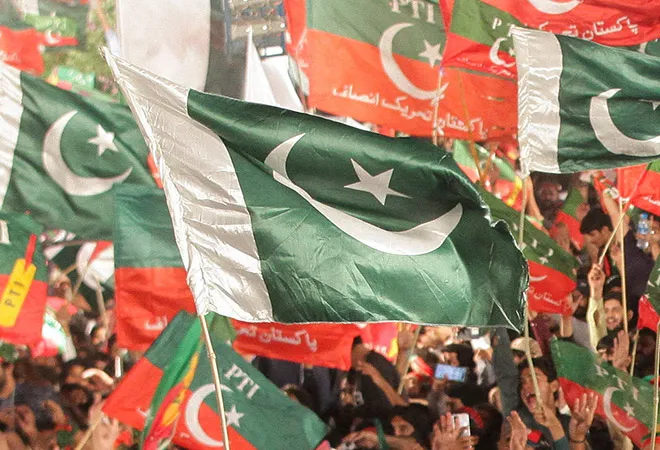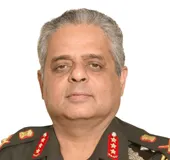 This brief is part of the series, Pakistan: The Unravelling
This brief is part of the series, Pakistan: The Unravelling
The fog over the events of 9 May and subsequent days is fast dissipating. The consequences of the rather boorish attempt by the Pakistan Tehreek-e-Insaf (PTI), to depict
spontaneous outrage following Imran Khan’s arrest, are also beginning to emerge. Autumn has set in for the PTI, winter is fast coming.
The mystery of the assault on Jinnah House seems to have been solved. It turns out, that on that fateful afternoon, Lt Gen Salman Fayyaz Ghani, former Corps Commander Lahore, was categorically instructed to stop the mobsters who were threatening to invade Lahore Cantonment. General Ghani, a known Imran acolyte—an ‘Imrandar’ general in Pakistan social media parlance—who had on earlier occasions too hesitated to act against Imran, dithered yet again. During earlier protests connected with the killing of PTI activist Zille Shah, for instance, the good General had, in fact, reprimanded his chain of command for acting to stop the protestors. Chief of Army Staff General Asim Munir consulted quickly with Chairman Joint Chiefs of Staff Committee General Shahid Shamshad Mirza and
sacked General Ghani instantly. Consequently, his subordinates, mainly his two General Officer Commanding, did not take his calls. In the confusion that followed, Jinnah House was ransacked. The Pakistan Army’s institutional solidarity that Imran had sought to breach, faltered gravely, but courtesy the sacking recovered and has held intact
. Albeit by a slender thread.
Imran very nearly destroyed the institutional cohesion of the army—investigations have revealed that the attacks were carried out with the help of accomplices from within the army, who provided navigation, targeting assists, pin locations, and details of entry and exit—with the alleged mastermind being General Faiz Hamid. The ‘Imrandar’ Generals are now beginning to get isolated. By September, whence Asim Munir will get to anoint the next generation of Corps Commanders, the cleansing perhaps will be complete.
The Pakistan Army’s institutional solidarity that Imran had sought to breach, faltered gravely, but courtesy the sacking recovered and has held intact.
September is also the time by when some of the ‘Imrandar’ judges will be weeded out. In any case, much of the sympathy with Imran has begun to fade after the acts of sheer gangsterism by PTI cadres. A certain brazenness has also set in; that should explain the
re-arrests of PTI stalwarts and former Cabinet Ministers, Fawad Chaudhary and Shireen Mazari, despite court orders to the contrary. After the Pakistan Democratic Movement protests—orchestrated by Maulana Fazal-ur-Rehman and Maryam Nawaz outside the Pakistan Supreme Court—the judiciary has also begun to sound conciliatory notes. Just to make sure, a
judicial reference against Chief Justice of Pakistan Umar Bandial is being contemplated by the National Assembly. Meanwhile, as a visible sign of Establishment re-grouping, a
Special Corps Commander Meet, as also the National Security Committee headed by the Prime Minister, have decided to proceed against the mobsters, abettors, instigators, and conspirators of 9 May. A larger crackdown has been initiated—the Army has been called out in
Punjab and Khyber Pakhtunkhwa, it has been requisitioned in Sindh and some 5000 arrests have been made. It seems even Imran will be tried under relevant provisions of the Army Act, which means that the legal proceedings thereof, may not be judiciable in civil courts. The death knell of Project IMRAN KHAN has been sounded; the noose around his neck has begun to tighten.
The tragedy of Pakistan is that there is no neutral arbiter left in the State apparatus—not the judiciary, not the Presidency, not even the Pakistan Army—all institutions are so deeply embroiled in politics and its many slants that Pakistan’s larger statecraft is in a veritable mess. Imran, in his hubris, attacked the citadel of the Pakistan military to send a direct message to his bête noire Asim Munir; he was encouraged to do so by a nudge and wink from within the Army’s ranks as also because he was secure in the belief that the Chief Justice would bail him out, which he eventually did with great love and affection. It is quite clear that he miscalculated badly and has incurred the wrath of the State.
The PTI, as a political party, is now in serious disarray; its wickets have begun to fall. A few exits are driven by conscience, others by software updates. The cadres are also feeling abandoned. Key leaders have condemned the events of 9 May, others have submitted their resignations. There is also talk of a split. Imran has squandered his immense popularity with one false step.
After the Pakistan Democratic Movement protests—orchestrated by Maulana Fazal-ur-Rehman and Maryam Nawaz outside the Pakistan Supreme Court—the judiciary has also begun to sound conciliatory notes.
Project IMRAN KHAN has traced a familiar journey in Pakistani politics. Riding on his cricketing glory, Imran sought political power. Cognisant of the great salience of the Army in the power structure, he hung on to its cloak tails. The Inter-Services Intelligence and the Army responded enthusiastically, curating a monster in the process. Till the very end, he sought to bargain his popularity for the appendages of power through the good offices of the Pakistan Army—his pleadings for a meeting with General Asim Munir, that did not materialise, is the latest example. Political expediency rather than lofty principle was always the guiding leitmotif. Imran’s core belief, in any case, was not the apoliticality of the Army, but its usefulness to his political cause. He stood up mobsters within his own party to alternately coerce political opponents as also vilify instruments of military authority to suit the shifting sands of his political objectives. In consequence, his power lost purpose and the promise of Riyasat-e-Medina dwindled into downright hell. Even as mercurial a populist as Imran must realise that popularity acquires legitimacy only when it respects the rule of law.
In so far as the Pakistan Army is concerned, it must smell the brew of the coffee in this Naya Pakistan. Large swathes of public opinion are indeed challenging the stranglehold of the Pakistan Army on the State. It must realise the futility of creating monsters like Imran and installing them in power; ultimately, they not only break your hearts but also bruise your lips
. It must also revisit its credo as ‘the guardian of Pakistan’s territorial and ideological frontiers’—more modest aspirations will suffice. Its generalship must re-educate itself in the fundamentals of civil-military relations, namely, ‘that the civilian is right when he is wrong, the civilian has a right to be wrong.’ Only then will the tension between people as the fount of power or power flowing from the barrel of a gun be resolved.
Large swathes of public opinion are indeed challenging the stranglehold of the Pakistan Army on the State.
Meanwhile, Pakistan continues to hurtle towards
economic disaster; the economy is growing by a paltry 0.5 percent, the International Monetary Fund loan continues to be elusive, even
remittances from Pakistanis abroad declining. Almost everybody seems to be losing faith in Pakistan. Civil war, constitutional mockery, and economic ruin are a ripe cocktail for state collapse. The idea of Pakistan is a distant dream, even its structural existence is under threat.
For India, the one lesson may be this: Use the reprieve (granted by the mess caused by Imran) along our Western borders to strengthen our strategic poise vis-à-vis our Northern adversary. The wisdom that we have shown in evolving a civil-military relationship of mutual respect must now metamorphose into civil-military fusion to aggregate our conjoint capacities and narrow our power asymmetries vis-à-vis China. In a larger sense, it may be wise to remind ourselves: Pakistan is only a pest, it is China that is the real threat.
Lt Gen Raj Shukla, a recently retired Army Commander.
The views expressed above belong to the author(s). ORF research and analyses now available on Telegram! Click here to access our curated content — blogs, longforms and interviews.



 This brief is part of the series,
This brief is part of the series,  PREV
PREV


